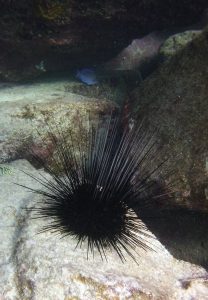The long-spined sea urchin (Diadema antillarum) is an important herbivore on Caribbean reefs. In 2022, there was a mass die-off of this sea urchin all over the Caribbean, echoing a similar die-off in the early 1980s.
A paper reporting on the identification of the causative agent was published recently: A scuticociliate causes mass mortality of Diadema antillarum in the Caribbean Sea, by Ian Hewson et al. (48 authors in total), SCIENCE ADVANCES 19 Apr 2023, Vol 9, Issue 16. DOI: 10.1126/sciadv.adg3200.
ABSTRACT
Echinoderm mass mortality events shape marine ecosystems by altering the dynamics among major benthic groups. The sea urchin Diadema antillarum, virtually extirpated in the Caribbean in the early 1980s by an unknown cause, recently experienced another mass mortality beginning in January 2022. We investigated the cause of this mass mortality event through combined molecular biological and veterinary pathologic approaches comparing grossly normal and abnormal animals collected from 23 sites, representing locations that were either affected or unaffected at the time of sampling. Here, we report that a scuticociliate most similar to Philaster apodigitiformis was consistently associated with abnormal urchins at affected sites but was absent from unaffected sites. Experimentally challenging naïve urchins with a Philaster culture isolated from an abnormal, field-collected specimen resulted in gross signs consistent with those of the mortality event. The same ciliate was recovered from treated specimens postmortem, thus fulfilling Koch’s postulates for this microorganism. We term this condition D. antillarum scuticociliatosis.

